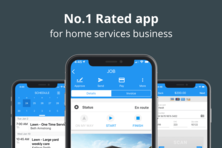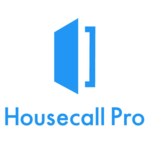Field service scheduling software enables businesses to easily schedule, plan and dispatch their workforce to ensure customer satisfaction. Scheduling features can be found in most field service management (FSM) software solutions but there also standalone solutions that specifically focus on this vertical. In this case, field service scheduling software offers a variety of planning features designed to efficiently process jobs within a specific field.
Before the creation of FSM, most corporations and enterprises used Enterprise Resource Planning (ERP) and Customer Relationship Management (CRM) to handle most streamlined processes. However, these systems did not accurately provide the specific features needed by the field service industry. This is why FSM was created specifically for service companies. When using FSM, companies are better equipped to deliver onsite services to their clients while following certain steps to ensure customer satisfaction.
When using a field service scheduling solution, it is important to understand its main function—to efficiently schedule tasks for the ease of the workforce. Its primary functionalities involve scheduling visits, dispatching calls, allocating the workforce and tracking job progress. It is noted that in the field service industry, 57% of the calls require dispatching. This is an important factor to have when dealing with customers on the line.

 Housecall Pro is a fully-featured field service management solution with powerful scheduling capabilities. The solution facilitates dynamic and streamlined job scheduling that enables project managers, field service agents, and clients alike to stay stay in the loop.
Housecall Pro is a fully-featured field service management solution with powerful scheduling capabilities. The solution facilitates dynamic and streamlined job scheduling that enables project managers, field service agents, and clients alike to stay stay in the loop.
Field service scheduling software is used by most companies and corporations to handle incoming calls from customers in need of their services. Service companies who use the traditional whiteboard and paper method of planning their workforce often find a gap in their schedules. Instead of relying on just plain text to plot out their tasks, most modern organizations make use of software solutions.
In the field service industry, it’s important to have access to software applications especially when the employees are out in the field. They often make use of mobile applications and GPS tracking through mobile devices to access client information and details. Furthermore, it’s best to constantly update the client regarding an employee’s whereabouts during their appointed schedule.
When using field service scheduling software, companies find themselves reducing the time customers spend waiting for their appointments and improving the speed of their call scheduling. Service companies are aware of the different challenges they have to overcome in their jobs. This involves unexpected events such as work order volatility, canceled schedules, field worker unavailability and insufficient resources. The best way to overcome these unforeseen circumstances is through field service scheduling software.
Jobber is one of the top service scheduling software solutions in the current market. It is a cloud-based field service system designed specifically for small to medium-sized businesses. Designed to organize professional services, Jobber allows organizations to prepare job routes, monitor field workers and plan work schedules.
Several features are implemented in these specific software solutions such as drag-and-drop calendars, scheduling in the field, push notifications and calendar syncing.
This software functionality refers to the process of creating resource schedules on a real-time calendar visual application. You can use Gantt charts to book the resources. When using this functionality, customization and visualization of the workforce’s schedule becomes easier on your part.
Many organizations prefer using this functionality as it provides a simple overview of the tasks that have to be done within a certain timeframe. It lets you see what plans have already been plotted, which of your employees are free and the names of the clients who’ve set appointments. Most software lets you sort the job orders by the required skill set of the field worker. The calendar also lets you view your schedule depending on the month, week, day or even employee. This lessens the hassle of sorting through numbers and dates.
The drag-and-drop calendar feature also allows color-coded jobs, list view and client call history. Color-coded jobs make it easier to sort and dispatch the field workers based on the information found on the calendar. Secondly, if a multitude of information accompanies a specific job, you are given the option to check it out in the list view. This allows you to see crucial details. Lastly, the client call history feature enables employees to see the status of certain clients and the employee who was most recently in touch with them.
Overall, the drag-and-drop calendar simplifies the entire procedure of service companies with the help of automated processes and optimized resources.
The keyword in this feature is real-time. Notifications regarding new job orders can reach you anytime and anywhere, especially when you’re out in the field through its mobile application. This feature allows you to check the information regarding the job order and see if you’re available at the allotted time. However, if you are unavailable, the feature also allows you to compare team members’ schedules via side-by-side availability and schedule on-the-spot.
Push notifications refer to the notification sent to the employees when there’s been a change of schedule. Since not everything can fit in the calendar without a few complications and issues rising, this feature reduces the chances of missed appointments and late arrivals to appointments with the client. This ensures customer satisfaction regardless of any untimely events that may take place within the workplace.
Not only will this benefit the customers but it will also benefit the field workers in terms of their service schedule. They’ll get push notifications in the field regarding any new, rescheduled or canceled visits on that day. Since it works in real-time, employees are notified immediately after the change has been made.
Since field service scheduling software operates online, interested customers can book the services of the company through an online booking widget found on their websites. Scheduling software solutions often use the same widget throughout all of their sites and social media outlets. As long as a customer knows the name of your company and where to find you, the online booking widget will always be available for them.
Several field service scheduling software solutions have the visual scheduler display, which allows companies and businesses to schedule appointments using a visual representation. With this feature, you can delegate tasks to field workers based on their proximity to the job order. Because it’s integrated with GPS tracking software, you can also track the job order’s progress and employee work status.
Field service scheduling software solutions have been an integral part of many small businesses and medium-sized companies. It eliminates the chances of missed calls and compliance deadlines. Additionally, it helps employers to schedule and dispatch job orders to the workforce. Other benefits this system offers include:
Since the software solution is cloud-based, no installation process is needed. This also allows field workers within the workforce to have access to real-time information and see their schedules on the calendar. They can do this at any time of the day and anywhere, provided they are connected to the internet. Furthermore, cloud-based software offers automated and optimized procedures on routine tasks.
The system improves the overall process of taking calls from customers and dispatching them to your workforce. All of the information regarding the customer and job order can be found in a centralized location. This reduces any clutter normally found when planning and dispatching manually.
Schedule gaps occur when a field worker doesn’t have work during their work hours. This translates to revenue and income lost, especially in the field service industry. In order to reduce events such as these, companies and businesses use field service scheduling software to schedule their days effectively. On days where there are no customer appointments, routine maintenance check-ups can be done instead.
At the end of the day, field service scheduling software that is suitably integrated with most FSM software provides you with an alternative when it comes to daily transactions and organization. The software solution declutters details and information to make it easier for you to sift through job orders, plan the next appointment and dispatch the next field worker.